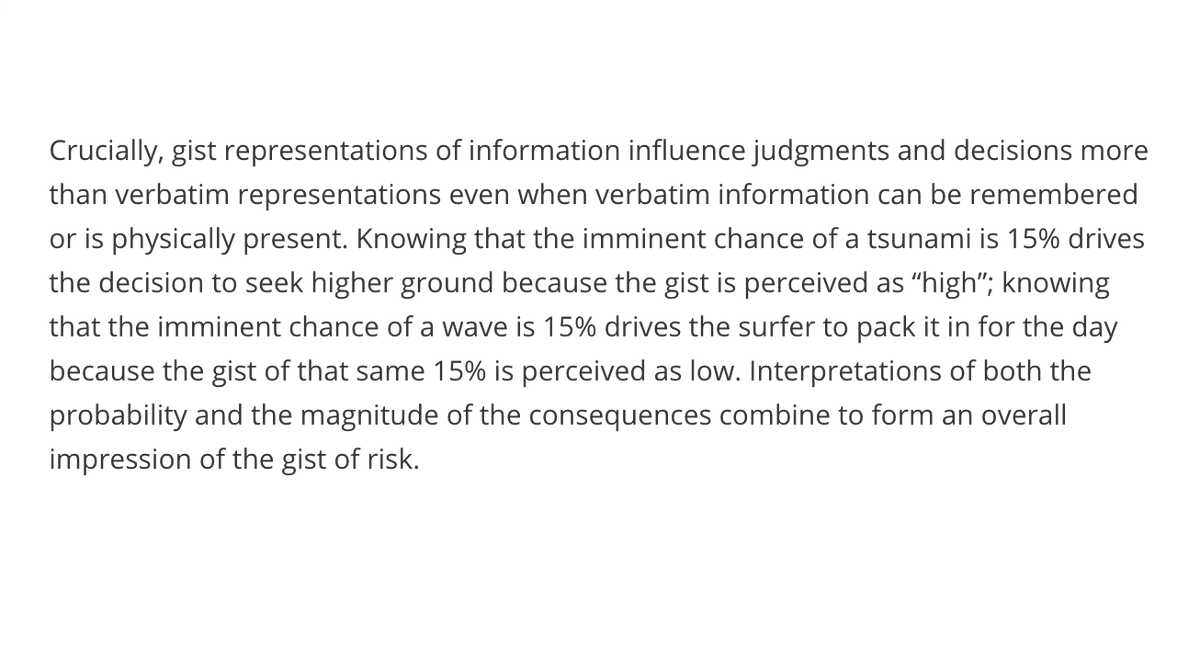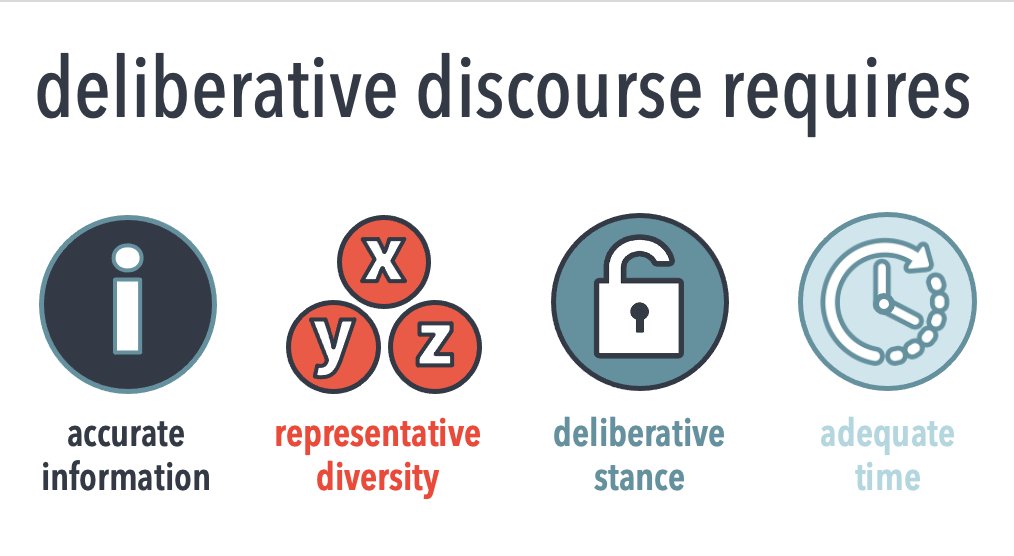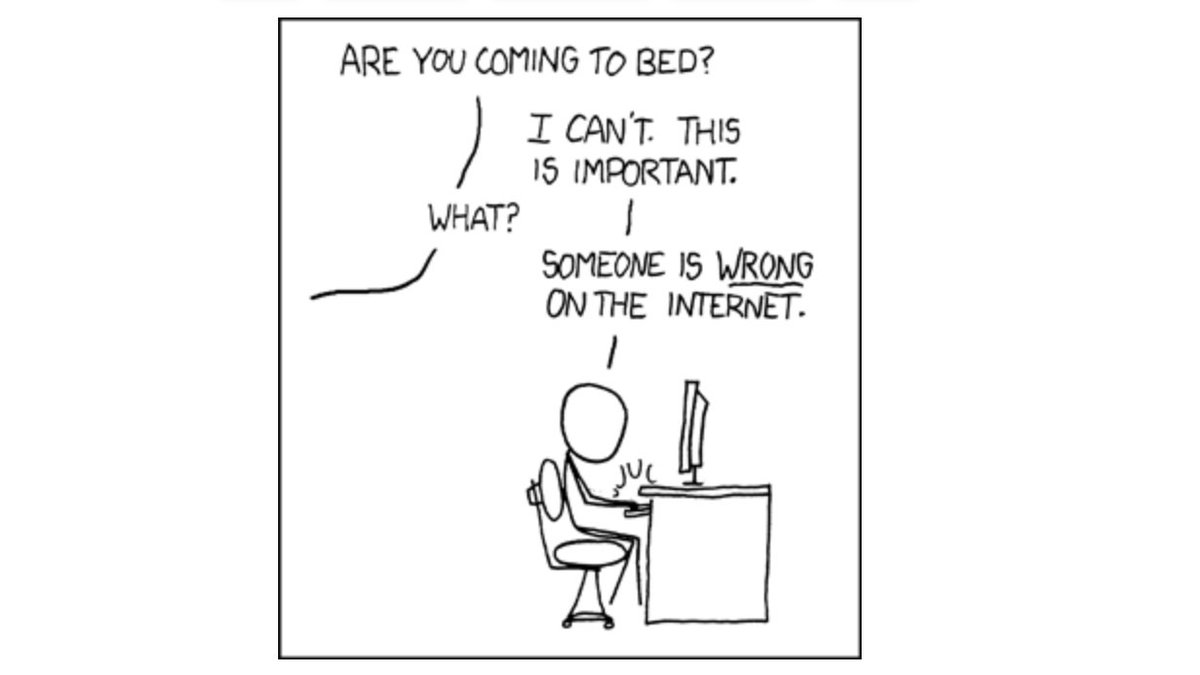
I thought very hard about how to use the precious time and attention a few hundred people gave me in my keynote this morning. I have heard countless #scicomm talks, but relatively little about #sensemaking, and I wanted to unite the two. A thread with highlights of my talk: 🧵
https://twitter.com/primrconnect/status/1382333253282115584
1. Although we have wildly disparate disciplinary perspectives, professional roles, and lived experiences, I know everyone who attends a #scicomm lecture shares one thing: constraints. Limited time, training, resources, or emotional bandwidth for doing the work.
2. If we are in search of #scicomm efficiencies, our best step is to examine foundational beliefs. What are the core principles and strategies that drive all your tactics? Let's start there - even (perhaps especially) seasoned veterans benefit from revisiting our assumptions.
3. "Assume a spherical cow" is an old physics joke (wired.com/2011/02/what-i…). It speaks to how simplifying assumptions - a necessary part of science and life in a complex reality - can lead us into ludicrous territory. Of the many #sphericalcows in #scicomm I'm focused on 3: 

4. First, consider the assumption that to know #science is to love it: that the core problem #scicomm faces is "the public" and their (lack of) understanding, making the solution to teach them stuff. This is the knowledge deficit model. It is very persistent but often quite wrong
5. There was an entire collection of papers in 2016 in the journal @SciPublic about WHY scientists keep making #deficitmodel assumptions - journals.sagepub.com/toc/pus/25/4 (paywalled, sorry, and yes I do see the terrible irony).
6. The problem is: when an argument is about complex and value-laden choices we face as a society, just throwing out more data and facts and figures is a superbly inefficient means to persuade or find solutions. Worse, it can often entrench and alienate people.
7. "It is tempting to treat matters of health, safety, and environmental policy as if they are primarily about facts, because this transforms intractable social disputes into seemingly answerable technical questions. But such moves are inimical to democracy."
Re-read that.
Re-read that.
8. That's from this brilliant piece from @SJasanoff et al: science.sciencemag.org/content/371/65… "Was science on the ballot" (again, frustratingly, paywalled. I'll loop back to this).
9. "When the key issue is who decides, acting as if disagreements are mainly about evidence is bad politics and bad social science. It turns expertise into an object of distrust and exacerbates American culture’s tendency to alienate people from the perceived elitism of science"
10. TO BE SURE: data matters! Facts matter. Education matters and is valuable. But if your audience is adults, draw from adult learning theory. People can and will learn incredible complex technical material when they are motivated by questions that are salient to their lives.
11. We cannot solve a problem if we fundamentally misunderstand and mischaracterize it. My hope is that we are as cautious and rigorous in defining our #scicomm objectives as we are in defining our research questions. More facts - mere facts - are rarely the solution.
12. Back for more after a rainy romp with the puppy!
The second #scicomm assumption that wastes time & effort: that what people say - especially #onhere - is a true reflection of their actual views and a good predictor of their behavior.
The second #scicomm assumption that wastes time & effort: that what people say - especially #onhere - is a true reflection of their actual views and a good predictor of their behavior.
13. I don't have a clever name for this #sphericalcow yet (suggestions welcome!) but it makes me think about text, subtext, and metatext.
How much of the material we produce is earnest? How much is posturing, point scoring, or a convenient persona?
How much of the material we produce is earnest? How much is posturing, point scoring, or a convenient persona?
14. If you are concerned about #misinformation online, as so many of us are, it helps to remember that "a meme my cousin's roommate posted" might be problematic, but it might not mean what you think it does, and may also not represent a segment of opinion worth worrying over.
16. On the issue of 'what is said' as (mis)representation of deeper beliefs and understandings: it was important for me to learn about fuzzy-trace theory & its core concept of gist. Verbatim recall is less important than what we think something MEANS (implications and valence)
I edited this piece by Valerie Reyna, explaining the importance of gist: pnas.org/content/118/15…
I feel like appreciating verbatim recall vs gist is *especially* meaningful for discussions that hinge on, oh say, "76% vs 79% efficacy"
I feel like appreciating verbatim recall vs gist is *especially* meaningful for discussions that hinge on, oh say, "76% vs 79% efficacy"

18. I think it's helpful to remember that outside of a small but powerful cohort of deliberately bad actors seeding disinformation, most people share misinformation because they are trying to be helpful. They believe it's true or likely to be true or helps people stay safe.
19. I keep coming back to the idea of safety and will again. Fear is such a primal emotion, and our risk assessments & decision-making are profoundly shaped by it. We can intellectualize all we want, but the limbic system always wins.
(sidenote, I quoted @hood_naturalist on this point about creating safety for animals later in my talk,
https://twitter.com/hood_naturalist/status/1380961232228769792?s=20)
20. To wrap up this passage, my #scicomm hope is that we understand that people don't (just) need answers, they need help with how to think ABOUT the problem. Science is only one tool, but it's a powerful one for rendering issues knowable & solvable.
21. And that approach is incorporated into best practices in debunking #misinformation. If you only have time to read one thing, make it The COVID-19 Vaccine Communication Handbook -
hackmd.io/@scibehC19vax/… (available in Spanish, German, French, Swedish, & Japanese so far)
hackmd.io/@scibehC19vax/… (available in Spanish, German, French, Swedish, & Japanese so far)
22. Third & final #sphericalcow: the assumption that the most powerful #scicomm is transactional, rather than relational. How likely is it, really, that answering one question or having one conversation will fundamentally change someone's mind? Is CONTENT the end-all-be-all?
23. I think #scicomm is like science: an incremental process full of setbacks, stall-outs, and breakthroughs. We build knowledge collectively, through iteration. If that's true, we might focus less on content & more on care. On creating safety, willingness to engage over time.
24. I am inspired by research on deliberative democracy, like this from Curato et al: amacad.org/publication/tw… Consensus-building is not the same as #scicomm, but a critical task for any high-stakes science issue. 

25. Finally, the biggest assumption of all: that great #scicomm is the solution to - everything - and it depends upon your personal skills & portfolio.
It's really something to believe massive, systemic issues are best solved by individual actions (fav meme from @DrAndrewThaler)
It's really something to believe massive, systemic issues are best solved by individual actions (fav meme from @DrAndrewThaler)

Piecemeal training is not enough. Individual actions are only one part of the solution.
What can we do *collectively*? How do we build solidarity and meaningful change?
What can we do *collectively*? How do we build solidarity and meaningful change?
27. Too often, I hear combative 'us vs them' rhetoric in #scicomm. When you enter a conversation with the foregone conclusion that it is a fight, you're doing real damage. Many (most?) science topics are not fights.
But when we do need to fight? We should brawl.
But when we do need to fight? We should brawl.
28. We need to protect our colleagues and communities that are under attack. Some #scicomm is high risk and people of marginalized identities suffer disproportionately vicious consequences. They should be provided with legal, technical, and other tangible support.
29. I'll bring this all to a close by saying that the #sphericalcows of #scicomm are not coincidentally related to the sacred cows of science writ large - especially the twin myths of pure objectivity and pure meritocracy.
30. A phrase that stays with me is "#sensemaking begins in chaos". We are in chaos. We are at a beginning. I believe #scicomm is a social justice issue. I don't have complete answers, but I do hope I've given you fresh ways to think about your #scicomm.
I am informed & inspired by so many, often without their knowledge. This talk was shaped by knowing or following @moefeliu @edyong209 @DrRubidium @wrong_whale @maddie_sofia @JedidahIslerPhD @jovialjoy @frkearns @BerondaM @IBJIYONGI.
Follow/read/listen/subscribe/buy their books!
Follow/read/listen/subscribe/buy their books!
• • •
Missing some Tweet in this thread? You can try to
force a refresh



